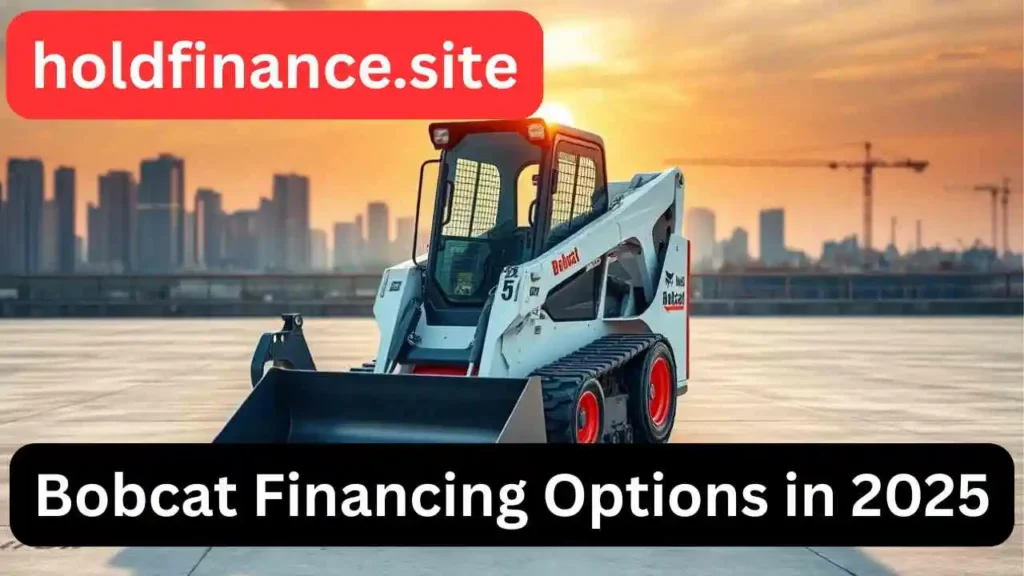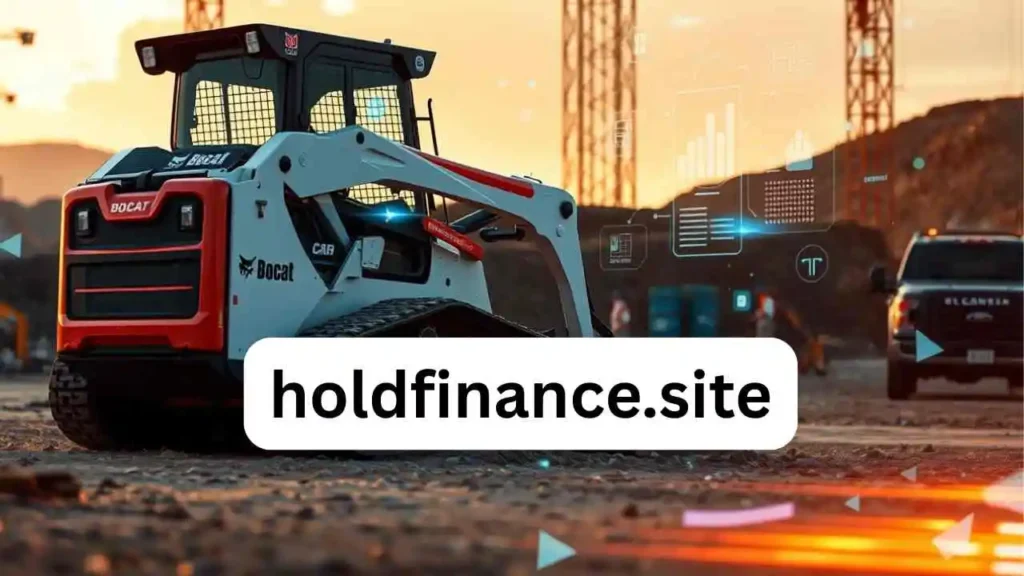The world of Bobcat financing is changing—and fast. Given the development of digital tools, flexible payment methods, and environmentally friendly funding sources, knowing the terrain is more important than ever. Regardless of your degree of experience as a contractor, following these trends could save you time, money, and a few headaches down road. Let’s explore what lies ahead.
Table of Contents
The Future of Bobcat Financing: Trends to Watch
Introduction of Bobcat Financing
Let’s face it—financing a piece of heavy equipment like a Bobcat isn’t exactly like buying a used car. There’s more at stake, more paperwork, and usually, a lot more cost involved. And yet, just like everything else, the way people pay for these machines is changing. Maybe even faster than you’d think.
What used to be a slow, paper-heavy, fairly rigid process is now bending in some pretty unexpected ways. From digital lending to on-the-spot financing and even subscription models (yes, like Netflix—but for dirt-moving gear), the future of Bobcat financing is already unfolding right in front of us.
Traditional Bobcat Financing Models: Still Holding On
Bank Loans and Equipment Bobcat Financing
Old-school bobcat financing isn’t dead. Not by a long shot. Many contractors, especially those who’ve built a relationship with a local bank, still lean on traditional loans. You purchase your Bobcat with a one-time payment and then repay it with interest. Simple. Predictable. Maybe a little slow.
Leasing Options and Their Lingering Popularity
Leasing is another go-to. This is very appealing to companies requiring tools for short-term work or those that want to frequently upgrade their tools. The monthly payments are typically lower, with reduced upfront costs. However, the equipment isn’t owned, which may be problematic for some.
Digital Transformation in Equipment Bobcat Financing
Online Bobcat Financing Platforms
If you’ve financed a car online recently, you already get the idea. Digital lenders have stepped into the construction equipment space, offering Bobcat buyers fast, user-friendly financing platforms. You compare offers, apply in minutes, and sometimes get approval the same day.
Faster Approval Times, Less Paperwork
Nobody misses fax machines or stacks of forms. Digital financing means less paperwork, and for many borrowers, that alone is worth the shift.
The Role of AI in Credit Scoring
Here’s where it gets interesting—some platforms now use AI to assess creditworthiness. They look beyond your FICO score and consider things like cash flow, equipment usage history, and even social signals. Creepy? Maybe. But also kind of convenient.
The Rise of Embedded Financing
Financing at the Point of Sale
Imagine browsing Bobcat models and getting an instant financing offer while you’re still in the dealer’s lot—or even online. That’s embedded financing. It’s seamless and often integrated into the buying process, which is good news if you hate red tape.
Bobcat Dealers Partnering with Fintechs
Many dealerships are teaming up with fintech companies to offer financing options that feel modern—low-friction and fast-moving. The result? Improved general experience; faster delivery; more sales.

apparatus-as—a-service, or EaaS, is what?
What is “apparatus-as- a- Service” (EaaS)? You do not know?
This is a big shift. EaaS means you don’t buy the Bobcat—you subscribe to it. Just like streaming TV or a coworking space, you pay for access rather than ownership. It’s flexible and often includes maintenance, which is a big plus.
Pay-per-Use Models Gaining Popularity
Some businesses are opting for pay-as-you-go setups. Why take out a complete lease or loan if you just use a Bobcat occasionally each month? These models let you scale up or down, depending on your workload.
Green financing refers to equipment loans that help fund low-emission projects.
Eco-friendly machinery incentives go here.
Interest in these types of equipment is usually low. Electric or hybrid Bobcats could qualify for Green loans, which are financing solutions that reduce interest or subsidize funds provided by government arms.
Financing aligned or supporting environmental goals is written here.
Construction companies aiming for sustainability certifications (like LEED) may find that going green pays off—not just in reputation but also in financing terms.
Custom Financing Solutions for SMBs
Flexible Terms for Small Contractors
Smaller operations often get left behind by big lenders. But some niche finance companies are stepping up with tailored loan products—smaller down payments, deferred starts, or seasonal payment structures.
Niche Lenders Stepping In
These players understand the real challenges of running a small business. They’re more willing to take calculated risks and look at the full picture, not just a credit score.
Blockchain and Smart Contracts
Reducing Fraud and Paperwork
Blockchain tech might still feel abstract, but it’s already being tested in equipment financing. Smart contracts can automate payments and reduce the chance of fraud.
Transparent Transactions and Ownership History
Every change of hands or payment milestone gets logged immutably. That kind of transparency can protect both the buyer and the lender.
Economic Factors Driving Change
Inflation, Interest Rates, and Credit Tightening
Let’s be honest—financing isn’t happening in a vacuum. Interest rates are volatile, inflation is still hovering, and lenders are cautious. Expect stricter terms, but also more creative structures to keep deals moving.
Risk Assessment in an Unpredictable Market
Lenders are using more data, more often. The idea is to balance risk without shutting out borrowers. It’s a fine line, and not everyone agrees where it should be drawn.
Government Policy and Infrastructure Bills
Stimulus and Grants for Heavy Equipment Buyers
Spend some time looking into public infrastructure as those recipients might qualify for some form of a grant or a tax incentive. It’s a hope, not a certainty, but worth seeing through.
How Regulation Might Reshape Lending Standards
On the flip side, tighter regulations could limit who qualifies for financing. Think of it as a double-edged sword—more protection, but maybe more hurdles too.
The Role of Manufacturer Financing
Bobcat’s Own Financing Programs
Bobcat offers its own financing packages, and they’re often pretty competitive. Especially for new models, the manufacturer can undercut banks or third-party lenders.
Comparing OEM Financing to Third-Party Offers
But it’s not always the best deal. It pays to compare. Sometimes, an independent lender has more wiggle room—or better terms for used machines.

Peer-to-Peer Lending in the Equipment Space
Is Crowdfunding for Bobcats a Thing?
Actually… kind of. Peer-to-peer platforms have dipped into equipment loans. Although it isn’t widely used yet, the idea exists.
What’s the Catch?
Well, rates can be unpredictable, and investor interest may vary. It’s more niche than mainstream—for now.
Buy Now, Pay Later for Heavy Equipment?
Stretching Consumer Models into B2B
BNPL started in e-commerce, but some providers are pushing it into B2B. Imagine splitting a $60,000 Bobcat over four quarterly payments.
Risks and Regulatory Scrutiny
This space is under the microscope. Expect tighter rules if it expands—especially around disclosure and borrower protections.
Predictive Analytics and Financing
Using Equipment Usage Data to Set Loan Terms
Some lenders are looking at real-time equipment data to personalize terms. If your Bobcat runs efficiently and gets maintained on schedule, you might get better rates.
The Trade-Off Between Privacy and Customization
Of course, that raises privacy questions. Sharing usage data is a choice—but it could mean saving thousands.
What This Means for Contractors and Business Owners
Smarter Choices, But Also More Complexity
There are more options than ever. But that can be overwhelming, especially for small teams juggling a hundred other decisions.
Navigating the Future with Confidence
The key is research. Compare offers. Ask questions. And don’t assume that the old way is the only way—or the best one.
FAQs
What is the best financing option for a Bobcat in 2025?
The size, use, and cash flow of your company all play a role. While subscriptions or EaaS may be more suitable for short-term need, traditional loans are best suited for long-term use.
Can I get a loan for used Bobcat equipment?
Yes, many lenders finance used machines, though the interest rates may be slightly higher.
What credit score is needed for Bobcat financing?
Generally, a score above 650 is ideal, but some fintech lenders consider alternative data too.
Are there eco-friendly Bobcat models that qualify for green loans?
Yes, Bobcat is releasing electric and hybrid models that may qualify for green financing incentives.
Is subscription based equipment access reliable?
It’s gaining traction and can be a solid option if flexibility matters more than ownership.
Conclusion
The future of Bobcat financing is shaping up to be more flexible, more digital, and—honestly—more confusing. There’s opportunity here, especially for those willing to explore new models. But with change comes uncertainty. So, stay curious, and ask a lot of questions—do not rush into anything. Because financing a Bobcat isn’t just a transaction, it’s a strategy for how you organically scale your business.
Read More:
How to Improve Kia Finance? My Chances for Approval
Redwood Coast Finance for First-Time Home Buyers